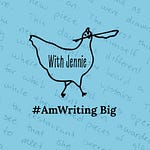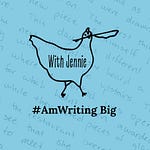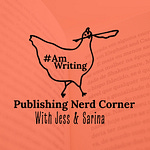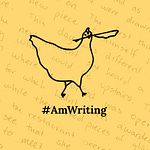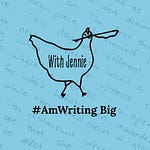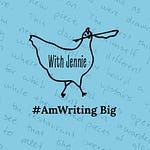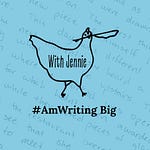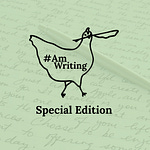
Big dreams, and how to achieve them. (Jess likes to be told she can do it. KJ prefers to be told she can't.)
This week, we’re talking goals, because KJ (and her co-writer, Wendi Aarons) nailed a big one: Daily Shouts, at NewYorker.com (read TK here). Some outcomes (like this one) are controlled by other people, but even then, setting the goal and taking steps to get there is the only way to make them happen. Contrary to the infamous advice of David Sedaris on Episode TK, if you don’t submit to The New Yorker, you’ll never get anything in there—and the same goes for everywhere else.
LINKS FROM THE PODCAST
#AmReading (and watching)
Other People's Houses, Abbi Waxman
Jess: The Butterfly Girl: A Novel, Rene Denfeld
A Discovery of Witches (book one of the All Souls Trilogy), Deborah Harkness
(and the miniseries)
#FaveIndieBookstore

Northshire Books, Manchester VT and Saratoga Springs
This episode was sponsored by Author Accelerator, the book coaching program that helps you get your work DONE. Visit https://www.authoraccelerator.com/amwriting for details, special offers and Jennie Nash’s Inside-Outline template.
Find more about Jess here, and about KJ here.
If you enjoyed this episode, we suggest you check out Marginally, a podcast about writing, work and friendship.
Transcript (We use an AI service for transcription, and while we do clean it up a bit, some errors are the price of admission here. We hope it’s still helpful.)
KJ: 00:20 Hey, I'm KJ Dell'Antonia.
Jess: 00:21 And I'm Jess Lahey and this is #AmWriting with Jess and KJ.
KJ: 00:27 #Amwriting Is the podcast about writing all the things, be the short things, long things, essay things, funny things, serious things. I forget what other kinds of things, writing all the things. But most of all, as we say every week, this is the podcast about sitting down and getting that work done.
Jess: 00:49 And I'm Jess Lahey and that is all I'm about right now. I wrote The Gift of Failure a couple of years ago and that book's been out and now I'm writing my second book and it is due really soon. And yeah, I'm, I'm sitting here and getting the work done as much as I can. So yeah, that's, that's all I have to say on that today.
KJ: 01:11 And I am KJ Dell'Antonia, the author of How to Be a Happier Parent and I have a novel due out next year, which I too am at crunch time on. So then you'd think that this episode would be the episode about crunch time. But no, no, we're gonna do an episode about crunch time and burn charts soon. Cause today we're gonna talk about a little something else I might have been writing recently. I abandoned all most freelance efforts in my novel writing quest and also my quest to have a good summer. But this one little tiny thing I just kinda kept doing and poking at and working on and suddenly low and behold, ka-ching, what is it, KJ in the New Yorker people. I am going to be with my coauthor Wendi Aarons in Daily Shouts in the NewYorker.com and we couldn't be more stoked. So today's episode is #bucketgoals.
Jess: 02:15 Yeah. And we've talked about this a little bit in the past. My big one of my big bucket list items was Creative Nonfiction and I published something in there a couple of years ago. And it is so gratifying to have this big thing like that's me, that means I'm a real writer. And then you get that thing in there and it's just huge. Now I do have to mention, it's so funny because we talk about just about everything, the two of us. But you are very cagey. I did not even know that you and Wendi were working on this together. And so I know nothing about this. I don't know what it's about.
KJ: 02:53 It was honestly, it was her, was it her? I think the idea came from her, then it spun into both of our ideas. And then, I mean, we really sent this back and forth in a matter of days and then she was like, McSweeney's. And I was like, heck no, let's go. So, you know, we went, we went all in and and here we are. Yeah. It wasn't, it was, and I think that this is probably the way that something like this might pan out. It, I mean it's, you know, it's the shouts. It's what, 800 words max, I don't even know how many words it is. And it kind of needs a little like I actually have one drafted because this is the kind of thing that you're like, Oh my gosh, and you're inspired and then you write it and then you have to go and sharpen and sharpen and sharpen and sharpen.
KJ: 03:47 And that was really Wendi's forte, because she is a regular humor writer, whereas I'm just a kind of a vaguely funny in my own writing writer. So it was good. So I have a couple of things to say here and I, I'm gonna say the funny, like positive one first. And that is that, Oh gosh. So 15 years ago when I first moved, 16 years when I first moved out of New York and moved into my first house in New Hampshire, our across the street neighbor, came over and was talking to me. And, and this across the street name or seemed to me to be a real person because her kids were older and she frequently wore real clothes in which she left the house to presumably do real things. And I was, you know, at home with this toddler and this other various pregnancies and then a baby.
KJ: 04:41 I don't remember at what stage of our relationship that this occurred, but you know, she said, what are, what do you do as one does? And I said, well, I'm a writer. And she said, what do you write in? The answer at the time was, you know, nothing, nothing that's ever been published anywhere except for a couple of restaurant reviews. And, and tiny, tiny, like 20 word book reviews in Timeout New York, which doesn't even exist anymore. And so I said, well, you know this, but this is what I want to do is, you know, I want to write books and I also want to write for magazines, like, you know, Real Simple and Wonder Time, which is dead and a bunch of other things that were dead and the Atlantic and the New Yorker. And she left. She said, Oh yeah, don't we all? And I was like, ouch, ouch. I can write for the New Yorker if I want. And of course, you know, that has stuck with, and she did not say that with any malice at all. None. But that stuck with me. So there we go. Well, and did it, there's some ... I'm making little wiggy, maybe hands like doing the happy dance. Did it...
Jess: 05:58 I remember years and years ago was listening to a podcast with Kevin Smith, the film director. And he talks a lot in his, or talked a lot in his podcast about just taking the leap and doing things that seem you know, maybe risky, different, but that the importance of having people around you who are like, yeah, you do that great. Yes, you need these people in your life that are going to say yes, you can do that. And you know, I, and I do understand that, but every once in a while a little, Oh don't we all kind of person in your life can give you just the kick in the pants.
KJ: 06:29 That works much better for me to be honest. Yeah. Yeah. If you say, of course you can do that. I'm like, Oh, quit petting me on the head go away, man, it makes me want to bite you. So yeah, no, I don't like to be supported, encouraged. I would very vastly prefer to be told that there is no chance that I could ever achieve that because then my drive to prove you wrong is so much greater than my drive to please, which is basically nonexistent. Okay. So here's the flip side of this bucket goal. And and I bet most of you know what's coming. It's only the New Yorker online. Oh, thanks brain. That was super helpful. It's not print, you know, it's not, the print was another real one. It's just, it's just the internet is not the real New Yorker. It's just that, that online New Yorker. So, so, yeah.
Jess: 07:28 Yeah, I understand that. I mean that's there too. I wrote for the Atlantic for many years and never ever in print. And yeah, that, that's a chip that people get. That's what you buy a pat on my shoulder. It's a very different, the, I mean, what's really interesting to know is that you know, for places like the, at Atlantic digital Atlantic and print Atlantic are two very different, not two different organizations really, but two very different groups and getting something into print is like a whole other step. I don't, you know, it's just a very different thing. So there is still this weird wall between the two. And, and that chip still exists, although I think it's less, I think really it has faded over time, but that doesn't help me right now.
KJ: 08:17 Okay. So first of all, I put that to bed with at the New York times a long time ago where there was for a very long time, a distinction, you know, is it going to be print? And then I very quickly realized that at least for the Times, the vast majority of people have no idea whether or not that thing was in print they read it online and that's how they read it. I don't think that's true of the new Yorker. I have no idea what they're, you know, online readership versus offline readership is. But daily shouts is its own thing to me and I'm super thrilled to be in it despite that little minor nag, nagging thing. And if I want to, I'll throw the print on the bucket list and Hey. Yup. I don't even, you know, I don't even know that it is. We'll have to decide, is this something I'm going to be, I mean, I do have another one that I'm going to try. Am I gonna, you know, am I going to do stuff like this? Am I not? This was a, it was just kind of an experiment. It was really fun. And then it just becomes a question of where are you going to put your time?
Jess: 09:19 Well, I can tell you right now that in this particular family, in the Lahey family, we have one exclusively online reader and one mostly paper reader. I'm the paper reader and my husband is the online reader. So you know, you have a 50, 50 split with us.
KJ: 09:35 Although of course, you know, we're about the same way. My husband is, you know, he's a largely, he said he sits at the desk on the computer every night. That's like sort of how he spends his evening is instead of in front of the TV, it's in front of the desktop, but he's reading, he's reading all kinds of stuff. He sends me emails of articles from publications that we get in print. Yeah. Yeah. Cause he typically, although you know, sometimes he'll read the print, but I like the print. It's just, I feel like the New Yorker is kind of a special case. Oh, for me it's a special case most of the time. Yeah.
Jess: 10:11 Around when I was a kid and to me being there was a really, really specific connection for me with a very specific person in a certain place. And my under my ability to understand the cartoons was something that I placed in the category of when I'm an adult. So when I started to be able to understand the cartoons, that's how I knew that I was getting to be kind of in adult range. And that was a big moment for me. And, and I have a very visceral sort of tangible connection with the paper magazine itself.
KJ: 10:44 Yeah. Most of them. I do love the paper, but I also, yeah, I bet. I read daily shouts all the time. And it's kind of its own thing and it's definitely, I'm definitely thrilled to little itty bitty pieces. We freaked when we hired and one and as Wendy would like me to add first try people. That's really great. First try like was her first try. It was my first try. It was a team first try. Uand you know, we, we scored it. I did point out to you that I am kind of like tempting fate at this point, but Hey, even even if for some reason they'd kill it and this never happens, I've signed a contract. Like, you know, they accepted it. If something blows up and you know, suddenly this is no longer funny because our topic becomes super sensitive for some weird reason.
Jess: 11:35 Oh, well, right. Well, I did point out to you that if you were taking David Sedaris up on his advice from our episode with him, you could have accomplished this long ago if you had just sat around not submitted and waited for them to come to, you totally should have for them to come to me and ask me because they were coming, they were going to knock me over. Absolutely. They were gonna just, you know, send somebody over and say, Hey, we have had our eye on you. For those of you who have not heard the David Sedaris episode, his advice was to be ready when they come to you, but not to put yourself out there and submit stuff. And we laughed and it was such a glorious movie. It was really, I really hate it when people ask for things you shouldn't pass.
KJ: 12:20 What, what? Okay. Yup. Hey, all right. There has to be one person in the world for whom there is an exception. That's what proves the rule and he is it everyone else, I, if you would like to have your writing featured in the publication of your bucket choice, you must first write the thing or the pitch and then you must figure out to whom you should send the thing or the pitch and in what format and you should do that correctly. And then you should actually press send. All of those things are required for most of humanity to see their dreams realized. So KJ, you're telling me as like a seasoned professional, you actually went to their website and looked at their like, you know, requirements for submission and actually followed rules that were set out? Well, no, because Wendy did. Okay. All right. I mean, or actually Wendy maybe didn't, honestly, you had the person's email address and I know, I mean this is an essay and, and we just send it the same way that I would send it right in the body, just FYI in the body of the email and as an attachment because it's a short thing.
Jess: 13:36 So that is, that is how we did it. Very cool. I'm just so proud of you. I'm so, so do you keep, do you have, is your bucket list something you ever, you are the kind of person who writes things down. Do you have a bucket list written down or do you just have these things kind of floating around in your head as wishlist items? Well, I mean, I have those big goals at the beginning of every year and shouts and murmurs was actually on it. I mean, this shouts, but it's fine. It's the same. It was on it, not this year, oddly enough, but last year and then at some point, halfway through the year, I was like, you know, that's not, I mean, that may be a goal, but it's not. So I'm not putting any energy into it. I wasn't trying, like I wasn't writing. I would, I would have ideas and I would throw them into a file, but I was not actually writing any of them.
KJ: 14:24 So it was only this year kind of when I stopped doing the more serious freelancing and I was focusing entirely on my new novel and my forthcoming novel and I guess maybe needed some little palate cleansers. So it was this year, I actually finally started to write them last year. I crossed it off the goal list in about July because I was like, you're not doing to move in the direction of clearly this is not a real goal. So the answer is I kinda have like, I think I have a mental bucket list that periodically goes on on the real goal list. But if it's not, if I had to write it down to remember it, it wouldn't be a real bucket.
Jess: 15:09 Cool. Gotcha. I actually have a Scrivener file for my bucket thing I'm working on right now. That I actually opened it up today. I had some notes that I needed to stick in there that I had like at 10 o'clock last night. And so that, that Scrivener document represents sort of my first attempt at having some essays that have thematic connection, which is funny. Actually my son who has been working on learning how to do digital music, he's been doing a lot of singles and so he, and I've been joking about the fact that, you know, I tend to do a lot of singles and he tends to do a lot of singles with his music. And so both of us at the same time are working on something that has a theme that's multiple singles, you know, multiple pieces put together in some sort of themes.
Jess: 15:57 So he and I both have a very similar goal right now. We've been checking in with each other on that. The hard thing for me is while I'm writing these things and some of them I really like these essays that I've been working on that are for this separate project. The temptation is always to grab it, especially if there's like a newsy hook and to submit it somewhere. And it's really hard for me as someone who over the past, you know, however many years has been like, Oh, essay, submit, publish, essay, submit, publish. It's really hard to break that sort of impulse to get it off my desk as quickly as possible and get it into the hands of someone who will put it out there in the world. And having patience for that has been interesting. It's good for me, I think.
KJ: 16:40 Well that's, I mean, but that's, that's kind of an open question because take Mary Laura. So I think what you're talking about is some form of sort of a, not necessarily a memoir in essays, but a thematic set of essays. And it's funny that that's your bucket because that when I, when we set out to record this, I was like, well, what is my next bucket? I was like, I think it's, you know, that's the one I've been playing with. I had to have a file in a list and a variety of things. But when we have had Mary Laura on, she talked about, you know, sell a lot of the material that was in, I Miss You When I Blink and it had been previously published.
Jess: 17:20 Yeah.
KJ: 17:23 There's a note in the cover. One of the things? Well, no, there's a whole list of, some of the material was stuff that she'd written for me at the times, but those things would be like pulled out as stories and popped into a different essays. Whereas I think she had an essay in the Paris, I want to say the Paris literary review or something, something very fancy sounding along those lines, which was made me go, ah, terrible bucket there. That's so cool. Yeah. That one is in there almost verbatim. So sometimes it's good to have the things published and sometimes it's proof of concept. I know someone else that's been working on something along the lines of a thematic set of essays and they need to get some of them published to show that there's interest in them. So. Hmm. But somebody in your position who's had so many essays published, maybe not so much.
Jess: 18:12 I figure for me the nice thing about putting these things together is they're still there and they could be published individually. And I think what I'll do is talk to our beloved agent once theirs are there, that's there. Once there's enough stuff that's there and once this current thing that I'm working on is done and sort of locked down, then I can start exploring that question with her. But in the meantime I'm just whittling away at it and getting ideas and putting things together and it's really nice, especially since I'm going to want, as soon as the editing, you know, is really locked down on the book that I'm working on now. It's, it's really important for me to have a thing on the horizon that's next, whether that's in the essays or a collection because otherwise I can be really prone to say, okay, this is going to be the next six months. All I'm going to do is home repair or something like that, which is totally like me to do that. All the, you know, we moved into this house a year ago and I've been writing nonstop since we moved in. And so I had this huge list of things we were going to attack as soon as we moved in. And none of those things are done. Not, not really one of them.
KJ: 19:20 It's a funny, actually a funny difference between your current book experience and my current book experience. So I wrote my book, my novel, the one that's going to come out next year, so that I wrote the draft of that for NaNoWriMo 2017 and then I finished it over the course of 2018 and we went out with it in about January, February of 2019 and sold it around then. And then I talked to my new editor at that point and then I did a big revision and then I gave it to her in early, it's sometime this spring. And then I, I knew that I was not like she was going to give me revisions immediately. So I already had a project that I had been like sort of, you know, shaping and creating and trying to start getting ready to be what I hope will be novel number two so that I would have something to write on but yours to work on while my editor edited because I did not expect that to be the kind of, you know, I did not strike me as some sort of overnight endeavor. But your editor you say is super fast. So that one, even when you turn this in, you will need to keep your head in this because you're going to be, you're going to be back at it within she so fast. Yeah, she's really, really fast. So yeah. And that's just who knows, you know, I mean, you know, because you've worked with this editor before and I asked and
Jess: 20:48 Therefore you know, it, it didn't really matter if it been, we've been three days, that would have been one thing. But I figured, you know, two weeks, two months, it doesn't matter. I need, you know, if I want to write a second book, I better start writing a second book. Can I tell you about it? Productivity thing that I've been doing that has been a total breakthrough thing for me. I don't know. It's kind of off topic. Can you not get a bucket product? Yes. You can tell me. Yeah, you can tell me it is. So no. So for fun there's this thing I was thinking about doing for fun that I thought would be just silly, which was to set up my phone and do a time lapse of what a day in the life of a writer looks like, which is, you know, spoiler totally boring cause it's really just a person sitting at a desk.
Jess: 21:32 But it ended up being really funny because the dogs are there and you know, all this crazy stuff is happening. And then I realized that do an interview in your wave your arms around like crazy fast, really funny. And then I did a second one because then I thought, Oh let me put it together a little nicer and do a little header and a little footer, blah blah blah. So I've noticed that when I'm, I have the time lapse on I and I have my screen, my screen is vaguely available to see on the time lapse. I can see if I'm messing around on social media or whatever accountability. So what I figured out and so then I thought, well, I'll just keep doing it because at the end it would be really fun to splice together a whole bunch of time lapse of the book getting done.
Jess: 22:15 And it's just silly. And it's funny and it makes me smile because I can see how the dogs run around and you know, while I'm running, well I'm, I'm writing and stuff. So I've been time-lapse videoing myself every single day as I write. And I don't care if these things never see the light of the day, light of day. There's something about the watching that makes me keep my butt in the chair and work from very early in the morning until right before I need to stop because it's like an invisible accountability person. I don't know what it is. Someone in the Facebook group even mentioned the am writing Facebook group even mentioned, Ooh, that might be a really great accountability tool for me. Someone else pointed out that you're not standing up enough. I know, I know now. Yeah, it was Lisa Belkin and now for Lisa, I wrote back. Okay mom.
Jess: 23:02 And so now every once in a while I get up and move around specifically cause Lisa Belkin told me I'm supposed to. Yeah, it's for me. I don't know if it would work for anyone else, but for me it makes me smile and it's and it's keeping me, eh, I, it's making, it's working. I mean, I think I'd be here anyway, but it also has been fun. So I know that I, that's a really funny in the result and B, brilliant, brilliant idea. It was funny. Yeah. That's, that's classic. Yup. What else are you doing? Well, yeah, I'm working. Right now I'm revising. I'm revising like crazy. So, and how was that during the summer?
Jess: 23:45 What's happening with your children? Is that okay?
KJ: 23:50 It's going okay. It has been a summer of a lot of visitors, a July of a lot of visitors and I managed to get my work done, basically to sum up it's August and they're used to it. At this point. I am sitting there, I am working every so often I have to say whoever I hear watching the office needs to put in headphones. And then they put in headphones and that's, that's it. There, there's this expectation that I will fit in one of the various places that I said, I actually don't lock myself away in an office, which I think has the result that they're all locking themselves away in their rooms.
Jess: 24:27 My office is visible from everywhere in the house, but I'm hitting the place in my freak out over the, over the due date for this book that I am, I become somewhat absent physically and a little bit and a lot more distracted and I get a little more absent mentally. And you know, my husband has prepared himself for this, but it also means that from my part, I have to work really hard to remember to go out to dinner. Like we went out to dinner and saw a movie earlier this week and it was really, really good for us to do that because I'm so absent mentally. Like in the evening I'm still thinking, I'm still taking notes on things. I'm still reading extra sources just to make sure I'm, you know, so it would be really, really easy for me to to be a real bear to live with. And so it's been really important for me to make specific time to go out with my family and do stuff and be there for dinner and stuff like that. Cause I'm, I'm not fun to live with right now.
KJ: 25:27 Yeah, I don't, I don't, it's different. It's just, you know, revision is a different process. So, and also this isn't, this is not a commas revision. This is a pretty intense, like, you know, how are these people interacting with each other and, and you know, is this line of the, this thematic landline strong enough throughout and, and you know, how has this reaction and is this person really, you know, expressing the, how low that they are at this night. It's that kind of thing. I can really only do it for three to five hours and that would be stretching it. So try and when I stop it lingers in the back of my mind, but it doesn't, it's not something I can go research for so well know it's, it's just I just have to, but I do require, like I, I require the hours and there, there have been a few days when what with I can't, you know, I can't go to the orthodontist and work on, I did and work on it in the waiting room and then come home and have 45 minutes and then have to drive somewhere and then do this and then do that.
KJ: 26:37 So there've been a few days like that. But by and large I've just kind of, if as long as I,
Speaker 6: 26:44 They don't get up till like 10 30. So if I get up earlier I can, well I would like to get my point out, solid out. I would like to point out this is a bucket list item for you cause you writing fiction. You know, most people know of you as you know a nonfiction writer. But writing fiction was always, you know, your goal. Cause there are a lot of people you know, have just started listening to the podcast or have just started, you know, just catching up that you know, may not realize that the fact that you're writing this book is huge. Bucket list, item, bucket list, career change because I don't want, cause I think bro bucket list, I think, you know, skydiving, you do it and then you never, and by the way,
KJ: 27:27 That's on my not bucket. Like can I have a list of things that I would rather kick the bucket and then, yeah, no. So skydiving, that's not true. I would skydive if the choice was skydive or diff. If the plane were on fire and I were wearing a pair of shoes, I would jump out of it. But I do not wish to do that anyway. I don't. So I, you're right, this is a bucket list thing, but I don't think of it as a bucket list thing because I don't intend to do it only once. So that's an interesting question and maybe that's true of shouts too. How does one define public bucket? Does it have to be something you only want to do once? Oh, I never thought of it. You can do it however we want. We can do it however we want.
Jess: 28:03 I thought of it as career goals in terms of like things that are really important to me that I achieve at some point. And you know, I said I got the creative nonfiction one. I definitely would like to write more for creative nonfiction. That was such a great experience. You know, of course new Yorkers out there and I've bounced a few ideas off of a staff person over there. And you know, got some feedback on that. Obviously none of it was positive because nothing ever happened, but it was always great. It was sort of one of those formative things. There's, there are a few other, I think for me also bucket list items have to do with things that are not necessarily part of some, I hate using this word, but like brand. Like there are plenty of things on my bucket list that are totally off-brand for what I normally do, but something that I would really like to do.
Jess: 28:53 So it's, yeah, it's part of a, a big picture career. I want to, I would like to have had these experiences I think more than anything else. So yeah, I don't know brand. I mean that's tough because you write about a topic and that's the brand and then people tell you not to stray from it. And I don't, obviously I don't buy it clearly, clearly. Let's see. We're at like, you know, we're getting close. Can we talk about what we've been reading? We can talk about what we've been reading is, so it's, so August, August,
KJ: 29:42 I actually, I have a surprise. You probably haven't been reading. I have been, and I read fiction this week, which is not normal for me normally, especially when I'm this deep into a book project. But I have been looking forward to reading this book for a while now. I read a book called the Butterfly Girl by Renee Denfeld and Renee Denfeld, I have to be total disclosure on this one, Renee and I have the same editor, Gail Winston at Harper books, which is how we originally got in touch. I was curious who Gale's other authors were. And so I got in touch with her and she she also, her career, her other work is something that I find fascinating, but she writes, she's written a book called the enchanted. She wrote a book called the child finder that came out last year and did really, really well. And this is another book with the same protagonist as in the child finder. And I have an advance of this book, but I also got thank you so much. LibroFM I got an advance audio version of it. So I read it in paper and listened to it and I, it's a breathtaking book. It is so good. I'm just, I can't rave about it enough. And the narrator also was just fantastic. So that's been my, my read this week and I love it. I love it. Love it, love it. And it'll be out in October. Cool.
KJ: 31:07 So we've been recording a little bit out of order. So I read one book by Addie Abbi Waxman, which was the bookish life of Nina Hill, which is her most recent book. And I talked about that on a podcast that we've already recorded but may not have aired. So we're getting a little out of order, but I liked it so much that I thought I'm going to go back and read something else by her that I have not yet read. And so I read something called Other People's Houses, which was, I don't know if it was her second or third. I don't know how many books Abby Waxman has. But anyway, this was, I believe the book before this, before the bookish life of nanny of Nina Hill. She is funny. She is unexpected. And this was a—-What do you say when a movie has a bunch of people in it and they all have equal roles? Kind of
Jess: 32:09 An ensemble piece.
KJ: 32:10 Yes. So call this an ensemble protagonist book a little bit. It had one main protagonist. Anyway, I thought she really nailed the ending and it's fun. And if you still have time for a little summer read in your, in your queue, I would recommend adding other people's houses because it was definitely lots of fun.
Jess: 32:28 I just looked her up. I'm seeing three books and there's nothing better than finding a new author that you really enjoyed and then realizing, Oh, there's more, more speaking of which actually this is totally, this is a little bit of a tangent, but I mentioned to Serena yesterday Serena has her own Facebook group, Sarina- sarendipity. It's really cute. And she bunch of gray R. I. N. A. yeah. And she, someone brought up the question in that Facebook group of how did you find Serena, how did you start reading Serena's books? And there's like 150 comments from people saying like how they found her, which is fascinating to me. It's, it's like, you know, watching people in a bookstore and watching them browse to see which books they end up buying. But all these people were talking about, Oh it came up as a recommendation or Oh I read it because I came at it through this other book and it's, it was the most fun, voyeuristic experience reading how people get to her. But a lot of people said the same thing that, you know, they read this one book and then they're like, Oh Bonanza, There's all these other books Cause she's got like two dozen books that you can read once you find the first one. And actually Renee den felt this the same way. She's got these three books and if you like one, you're probably going to love the other two. There's nothing more exciting. Yeah, no, that is, that is definitely fun. Oh, I actually watched something that was a spin off on a book that you had recommended to me early on. I watched the series, the discovery of witches, a book that you had recommended to me a couple of years ago, that LG is a child G, it's a trilogy with a fourth book that, that I didn't like as much as the original trilogy. Well, I have to say the reason that I watched it is that Matthew Goode, who is a British actor that I really love, he was in the crown. He's been in a whole bunch of other stuff.
Jess: 34:24 Oh, he was in Downton Abbey. He wasn't in the crown, sorry. He was in Downton Abbey. Anyway, he's fantastic and he plays the protagonist vampire guy. And so I watched it as a reward. Like while I was cooking dinner after I had finished writing for the day. And it was delightful. But I do have to say, the one scene I was really hoping would be there was the scene where she goes to yoga class with the vampire and and, and it wasn't there. I was very sad. That's in the book. Yeah, there's a, there's a scene, there's a scene at the, and I don't know why I liked it so much, but there's a scene at the very beginning where he takes her to like a supernatural people yoga class.
KJ: 35:04 Oh, I do remember that. Yeah. You do thought that would have been fun to film. Yup.
Jess: 35:12 I will say that the Mini series is really good and the only reason we watched it is that I realized it was there is that if you're on I think Amazon or Hulu or one of the two, there's a subscription. You can get to scary movies called shutter. And my son really likes scary movies and so we did the seven day trial in order to, so he could watch some scary movies he wanted and then we'd canceled it. So I had to watch the entire series really quickly or wasn't going to be able to finish it. So I really enjoyed it. It was really, really good. So if you are, if you like you know, if you like the series and you're curious about whether or not you should dip into the mini series or the S for the first series cause it ends, it ends before I think before the first book ends.
Jess: 35:55 So it's, it's obviously going to continue. And Matthew Good was as luscious and wonderful as I thought he would be. He's just, he's wonderful. And actually the woman who plays the, which she was great. Yeah. As a truly that that trilogy was just so fun. I read the first tune and had to wait for the third and they were just, yeah, that was it was, it was fun. I had pressed a lot of buttons. Well yeah, because it has the whole like history, history and literary sort of stuff woven in and the symbols and you know, I, I enjoy all that stuff. It was super geeky and witchcraft and discovering that you're special and yeah. Yeah. It just, it had the actresses for it actresses who played the aunts, the upstate very smart and two are really good. Oh, you would like them. I am sure that I would.
Jess: 36:45 Yeah. All right, well gosh, we have all kinds of crazy recommendations. I know books and many searching, listening, reading. Would you like to do the independent bookstore? Shout out this week because if you don't have one, I have one. I would love to shout out. I always have end of okay, then go books. Well, but except that I hadn't even thought of it. So if you have one in your head, go for it. I do North Shire books and I know that's one that you love too. In Manchester, Vermont is an awesome one. North Shire books. Last time I was there I was on my way down with my son to go somewhere else and I'm like, well, we're going to Manchester because we can't drive past Manchester without going in. It is a delightful two story. Huge in chanting like what a bookstore should be in terms of the interior.
Jess: 37:34 There's a grand staircase up the middle to the children's section upstairs. They have great book events. I did, I was really lucky I got to do a reading. When gifted failure first came out and they had, we had a standing room only. They're really good at at promoting their events. They get people that come there specifically for the book events and it's just a wonderful bookstore. And so I, you know, I left it at that North char books, Manchester, Vermont, but then I did an event near Saratoga Springs, New York, and there's another one in Saratoga Springs and they not only sold books at my event near Saratoga Springs, they brought other books that are on my bibliography and did this big table that had my book and Ron Leber's the opposite of spoiled and Carol Dweck and a whole bunch of other people on the table so that if people were interested in also buying books that I had recommended during my talk, they were there.
Jess: 38:34 And it, they have been so supportive and so wonderful in their in how they've handled their, their events in their book signings. I'm just, I'm terribly impressed by them and they get great people to read there. I was going to go see the woman, Oh shoot, I'm going to have to look her up, but I was going to go down there in the winter. It can be a little dicey getting there because the roads can be a little treacherous. And I was not able to get there for an event recently because of the roads. But if you go there in the summer, it's beautiful. It has a great bookstore. It's fantastic. One read. Yep. Agreed. Yep. Anything else you want to hit? Are we done for the day? No. No. So it's, it's August if you're listening in real time. Eh, but that does not mean you can't be getting your work done. So I'll let you take it out Jeff. Well, and also I have to say, people, I have noticed this is not going to be hard for a little bit, but I have been noticing that people's kids are going back to school. So yay. You people. Mike sister's kids have been back in school for a week now and she's like, ha.
KJ: 39:47 My theory is it sort of starts in the middle and the South and then it spreads because you know there are places that go back at the very beginning of August. Then it rolls all the way through. August hits us the week before labor day and then New York city usually is last and at the week after if the day, the Tuesday after labor day. Yeah. So I'm still treasuring, not getting up and summer weather and not having obligations. But there are certainly advantages to that moment when we all get our fall fresh start
Jess: 40:21 Except every single time anyone mentions anything about the fall I'm like, no, no fool. My deadlines is in the fall. No one's allowed blow. Mine is September 1st so yeah, there, there is that all right. All wrong deadlines later.
Jess: 40:35 It sounds like KJ and I have work to do until, so until next week, everyone, keep your butt in the chair and your head in the game.
Speaker 3: 40:49 [Inaudible]
Jess: 40:49 This episode of #AmWriting with Jess and KJ was produced by Andrew Parella. Our music is aptly titled Unemployed Monday. It was written and performed by Max Cohen. Andrew and Max were paid for their services because everyone, even creatives, should be paid for their work.



